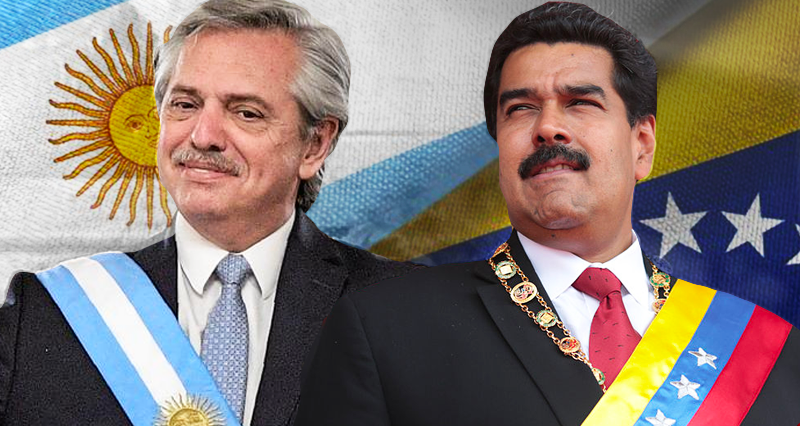By Douglas Bolivar / Caracas, additional reporting and edit by Yunus Soner
On April 18, Argentine President Alberto Fernández announced his country would “fully reestablish diplomatic relations with Venezuela”. Leading the CELAC within pro tempore presidency, Fernández also called “all Latin American countries to do the same”.
The Argentine government thus recognizes the legitimacy of the Maduro government in Venezuela, abandoning its previous position. The former Argentine government under President Mauricio Macri had recognizing Juan Guaido, US-supported Venezuelan politician who had declared himself president, as representative of the Venezuelan government in 2019.
“Venezuela will not achieve functioning normally if the country is left alone, without diplomats and without attention”, said Fernández. Argentina is expected to reestablish its ambassador in Venezuela in the coming days.
According to Argentine news outlet El Cronista, bilateral trade agreements and especially energy cooperation will soon be on the agenda of Venezuelan-Argentine relations. Speaking to United World International, Ángel Rodríguez, President of the Venezuelan Parliament’s Commission on Energy and Oil had stated that his country could become “Latin America’s energy locomotive”.
“Victory of the Venezuelan resistance”
Speaking to UWI, Sergio Rodríguez Gelfenstein, former Director of International Relations of the Presidency of the Bolivarian Republic of Venezuela, evaluated Argentina’s step as “result of the Venezuelan people’s successful resistance against the US and its blockade. Had the Venezuelan people and government not resisted, this step had not been taken.”
Ilena Medina qualified in conversation with UWI the Argentine step as “appropriate”. Medina is Deputy President of the Venezuelan National Assembly’s Commission for foreign relations, and a member of Patria Para Todos, a party in coalition with the PSUV within the Great Patriotic Pole.
A veteran diplomat with 25 years of service in foreign affairs, Medina highlights that the crisis in Ukraine had “a boomerang effect” on US policy in Latin America. According to Medina, the Argentine President has acknowledged the economic difficulties resulting from the Eurasian conflict, which has consequences not only for energy but also for basic alimentation.
Medina says that Fernández has acted according to the mission of CELAC, which is to promote the integration of Latin America, and reminds that Venezuela has been a founding member and greater supporter of the organization.
Venezuela’s re-integration to Latin America
Gelfenstein points out that Argentina’s step is part of a broader process. “Venezuela has already established full diplomatic relations with Peru, and the Foreign Minister of Costa Rica also has expressed desire to follow. With a potential electoral victory of Gustavo Petro in Colombia and Lula da Silva in Brazil, which are reflections of democratic changes in Latin America, this process will be even more accelerated”, he says.
And for the remaining right wing government in Latin America, the fact that the US has sent an official delegation to Caracas sends a clear message, Gelfenstein adds.
Back in December, PSUV deputy Jacobo Torres de León already had predicted the return of Venezuela to the MERCOSUR.
Debate on Summit of the Americas
The United States and its allies had organized a global campaign to delegitimize the Maduro government, called for international recognition of Juan Guaido as President of Venezuela. Guaidó has criticized Argentina’s step as “premature” and demanded support for elections.
But given the continental shift towards Venezuela’s legitimate government, Guaidó’s political future remains unclear. A last minute development came when Mexico’s government demanded the Summit of the Americas, planned to take place in summer in the US, should include “all governments of Latin America without exception”. The United States government had considered publicly to exclude Cuba, Nicaragua and Venezuela from the summit.

















Leave a Reply